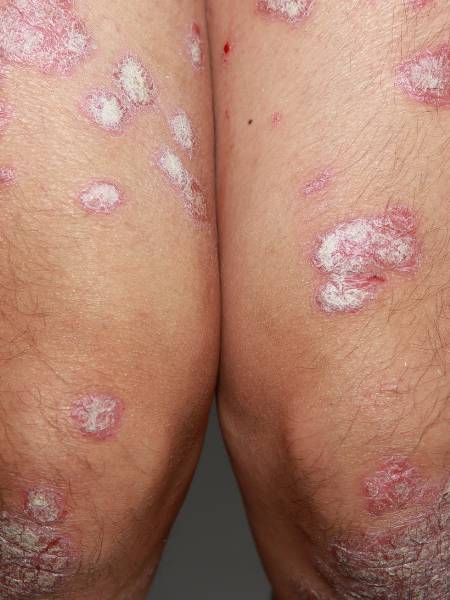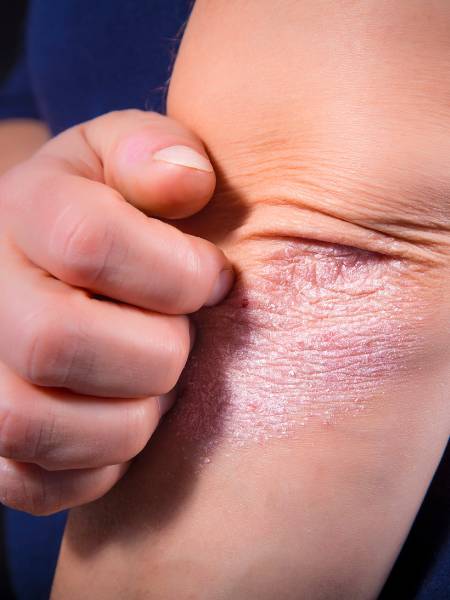Psoriasis Treatment
- Home
- Our Services
- Skin Treatments
- Psoriasis Treatment
Effective Psoriasis Treatments and Relief Options
Contact us to schedule your Treatment today!
Psoriasis is a long-term skin illness. The body’s defense system mistakenly attacks healthy skin cells. This causes skin problems for many people around the world. People with psoriasis have itchy, red, and flaky skin patches. These patches make them feel uneasy and self-conscious. But there is good news! Better psoriasis treatments are now available. They can help manage the condition well. Let’s learn more about psoriasis symptoms, what causes it, and how to treat it for healthy, clear skin.
Understanding Psoriatic Disease
Psoriasis is a long-term skin problem. It makes the body produce too many skin cells. The extra skin cells build up and form red, scaly patches. These patches can appear on the scalp, elbows, knees, and nails. It is vital to know what causes psoriasis before looking at symptoms and treatments. The body fails to shed old skin cells properly, leading to the buildup.

Detail about Psoriatic disease symptoms
Psoriasis comes in different types, and each type has its specific symptoms. Commonly called plaque psoriasis, in which red patches covered with silvery scales appear raised on the skin. These may usually appear on the scalp, knees, elbows, or lower back of people who suffer from it. Other types include guttate, inverse, pustular, and erythrodermic, with distinct characteristics.
Moreover, this ailment can cause itchiness and burning pain, making life difficult for patients day to day-to-day activities done by these people. Skin peelsRecognizing these symptoms aids timely intervention and good care given to affected individuals.
Clarifying the myths about Psoriatic Disease
Psoriasis is more than a skin disease. Thus, the skin condition more closely resembles a disease that could affect the rest of the body. Research suggests that psoriasis might be linked to other illnesses like heart disease, diabetes, and depression. This points out the need for intense care and dedication for individuals dealing with psoriasis.

Revealing Options For The Treatment of Psoriasis
Are you suffering from Psoriasis? Don’t worry, we have a solution. At Eliixirskinhairclinic, we offer different treatment options by Dr. Shikhar Chaube, a dermatologist with over five years of experience.
Topical Treatments:
For mild to moderate Psoriasis, topical treatments are usually the first step. These include corticosteroids, coal tar preparations, vitamin D analogs, and retinoids. These medicines are applied directly to the affected areas to reduce symptoms like inflammation, itching, and scaling.
Phototherapy:
This treatment uses light to make skin look brighter. It slows down the rapid growth of skin cells in psoriasis. A dermatologist exposes the skin to ultraviolet rays. Two forms are UV phototherapy and PUVA therapy, where psoralen medication increases UV sensitivity.
Systemic medications:
For severe psoriasis, doctors may prescribe oral or injected drugs. These work differently than topical creams. Oral drugs like methotrexate and cyclosporine retinoids target the condition. Injectable biologics block specific immune responses driving inflammation and symptoms.
Lifestyle measures:
Healthy habits complement psoriasis management; hence it is necessary to maintain a healthy diet and avoid low-calorie diets; reduce stress levels; keep a record of stressors such as certain medications or infections; and apply non-prescription lubricates regularly.
Alternative Therapies:
Psoriasis acts in unexpected ways. Some natural treatments may help ease symptoms. Examples are acupuncture, herbs, and diet changes. These complementary therapies provide relief, not cures. Before trying them, talk to your doctor. Make sure they fit your treatment plan.
Different people have different psoriasis symptoms and treatments. Doctors called dermatologists understand this skin condition. They advises to manage psoriasis successfully. Talk to a dermatologist about your options.
Other Treatments Available
Why Choose Us?
Are you having health problems? Contact us today!
Address Business
Contact With Us
Call Us 24/7: +91 91520 10115
Working Time
Conclusion
In conclusion, Psoriasis treatment is not one simple process. It needs a special approach for each person. This approach looks at how bad the symptoms are, the person’s health, and their lifestyle. We can say that people with psoriasis can find relief and control their skin health by working closely with skilled dermatologists like Dr. Shikhar Chaube and actively managing their condition. Remember, you are not alone. Friends, specialists, and any help you need are there for you. So, you can get through psoriasis and reach your goals for a better and healthier life.
FAQs About The Service
How serious is psoriasis?
Is psoriasis a fungal infection?
Why Choose Us?
Are you having health problems? Contact us today!
Address Business
Contact With Us
Call Us 24/7: +91 91520 10115
